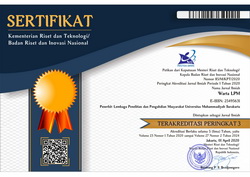Pembelajaran Science, Technology, Engineering, Art, and Mathematics (STEAM) Bagi Anak melalui Bermain Bersama Orang Tua
DOI:
https://doi.org/10.23917/warta.v25i2.645Keywords:
STEAM learning, play, parent-child interaction, preschool childrenAbstract
STEAM (Science, Technology, Engineering, Art, and Mathematics) learning is a method that integrates science, technology, engineering, art, and mathematics in learning so that it can be easily understood by students. STEAM learning is carried out from an early age to help achieve 21st century skills and the industrial revolution 4.0. Parents need to understand STEAM learning in order to be able to assist children in STEAM learning activities through playing activities at home. However, many parents are not familiar with STEAM learning. The purpose of this community service is to help parents prepare to accompany their children to learn STEAM. This community service involved 77 parents and children from TK A & B PAS Assakiinah. This activity begins with collecting initial data on the STEAM learning experience. The implementation stage is carried out by socializing and distributing STEAM learning mentoring modules for parents, STEAM learning practices through playing activities with children and family members at home which are recorded with video, sharing experiences of STEAM learning practices among participants, and evaluating activities. After participating in this community service activity, parents who were previously unfamiliar with STEAM learning became aware of STEAM learning. Parents feel happy when they practice STEAM learning with their children using the modules provided. The reaction of children who are happy and excited when participating in STEAM learning through play makes parents feel comfortable in enjoying togetherness with their children. If this practice continues, it can help build closeness between parents and children in the family. Thus, the STEAM learning module can be used as a guide for parents to assist children in playing activities with their families.
Downloads
References
Bhagat, V., Haque, M., & Jaalam, K. (2018). Enrich Schematization in Children: Play as the Tool for Cognitive Development. Journal of Applied Pharmaceutical Science, 8(7), 128-131.
Imamah, Z. & Muqowim. (2020). Pengembangan Kreativitas dan Berpikir Kritis pada Anak Usia Dini melalui Motode Pembelajaran berbasis STEAM and Loose Part. Yinyang: Jurnal Studi Islam Gender Dan Anak, 15(2), 263-278. https://doi.org/https://doi.org/10.24090/yinyang.v15i2.3917
Jannah, F. F. N. & Khotimah, N. (2017). Meningkatkan Motorik Halus Anak melalui Kegiatan Cooking (Memasak) di Kelompok A1 TK Al-Fitroh Surabaya. Jurnal PAUD Teratai, 6(3), 1-4.
Keown, L. J., and Palmer, M. (2014). Comparisons Between Paternal and Maternal Involvement With Sons: Early to Middle Childhood. Early Child Development Care, 184, 99–117. doi: 10.1080/03004430.2013.773510
Listyowati, A. & Karyanto, Y. (2018). Pengaruh Keterampilan Dasar Memasak terhadap Life Skills Anak Usia 5-6 Tahun di TK Kemala Bhayangkari 1 Surabaya. WAHANA, 70 (2), 57-61. https://doi.org/10.36456/wahana.v70i2.1752
Meriyanti, C. W. (2021). Kegiatan Menganyam dengan Bahan Alam untuk Mengembangkan Kemampuan Motorik Halus Anak. Jurnal Obsesi: Jurnal Pendidikan Anak Usia Dini, 5 (1), 729-742. DOI: 10.31004/obsesi.v5i1.667
Rahma, D. Y. (2021). Meningkatkan Pemahaman Orang Tua dalam Menstimulasi Perkembangan Anak dengan Pendekatan STEAM melalui Program Home Visit. Jurnal Tunas Siliwangi. 5 (2), 93-105. DOI:10.22460/ts.v5i2p93-105.1566
Rollè, L., Gullotta, G., Trombetta, T., Curti, L., Gerino, E., Brustia, P., & Caldarera, A. M. (2019). Father Involvement and Cognitive Development in Early and Middle Childhood: A Systematic Review. Frontiers in Psychology, 10, 2405.
Sadiah, N. ., & Lestari, R. . (2020). Upaya Meningkatkan Pengetahuan Sains pada Anak Usia Dini melalui Pembelajaran STEAM. CERIA (Cerdas Energik Responsif Inovatif Adaptif), 3(3), 237–244. https://doi.org/10.22460/CERIA.V3I3.P237-244
Sari, D. A. ( 2018). Meningkatkan Perilaku Prososial Anak Usia 4-5 Tahun melalui Metode Eksperiental dengan Permainan Tradisional. Jurnal Pendidikan Anak Usia Dini, 2 (2), 55-62.
Susanti, M. (2018). Peningkatan Kemampuan Motorik Halus melalui Permainan Menganyam dari Bahan Alam di Taman Kanak-Kanak Cahaya Hati Kabupaten Pasaman Barat. JRTI: Jurnal Riset Tindakan Indonesia, 4(1):32. DOI:10.29210/3003280000
Wahyuni, S., Efastri, S.M., & Fadillah, S. (2018). Meningkatkan Kemampuan Motorik Halus melalui Kegiatan Cooking Class Anak Usia 5-6 Tahun di TK Melati Pekanbaru. PAUD Lectura: Jurnal Pendidikan Anak Usia Dini, 2 (1), 61-72. DOI: https://doi.org/10.31849/paudlectura.v2i01.2005
Yanti, D. (2016). Meningkatkan Kecerdasan Logika Matematika melalui Kegiatan Fun Cooking (Penelitian Tindakan pada Anak Kelompok B2 di TK Negeri Pembina Pandeglang). JPPPAUD (Jurnal Penelitian dan Pengembangan PAUD), 3 (1), 7-18.
Zubaidah, S. (2019). STEAM (Science, Technology, Engineering, Arts, and Mathematics): Pembelajaran untuk Memberdayakan Keterampilan Abad ke-21. Conference: STEAM (Science, Technology, Engineering, Arts, and Mathematics): Pembelajaran untuk Memberdayakan Keterampilan Abad ke-21, di Universitas Wiralodra Indramayu diunduh dari https://www.researchgate.net/publication/336065211_STEAM_Science_Technology_Engineering_Arts_and_Mathematics_Pembelajaran_untuk_Memberdayakan_Keterampilan_Abad_ke-21
Downloads
Submitted
Published
How to Cite
Issue
Section
License
Copyright (c) 2022 Warta LPM

This work is licensed under a Creative Commons Attribution 4.0 International License.















